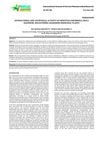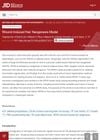 1 citations,
November 2023 in “Naunyn-Schmiedeberg's archives of pharmacology”
1 citations,
November 2023 in “Naunyn-Schmiedeberg's archives of pharmacology” Henna has potential health benefits and can treat various conditions, but more research is needed to confirm safety and effectiveness.
 1 citations,
March 2019 in “International Journal of Current Pharmaceutical Research”
1 citations,
March 2019 in “International Journal of Current Pharmaceutical Research” The essential oils from Hedyotis corymbosa, Inula racemose, and Holostemma adakodien have significant antibacterial and antifungal properties.
 1 citations,
January 2019 in “International Journal of ChemTech Research”
1 citations,
January 2019 in “International Journal of ChemTech Research” Eclipta prostrata has many medicinal benefits, but more research is needed to understand how it works.
 1 citations,
July 2018 in “Elsevier eBooks”
1 citations,
July 2018 in “Elsevier eBooks” FAPD and possibly CCCA may be AGA subtypes, and treatments combining antiandrogens, hair growth agents, hair transplants, and anti-inflammatories could be effective.
 1 citations,
May 2017 in “InTech eBooks”
1 citations,
May 2017 in “InTech eBooks” Some natural remedies may help with hair regrowth, but more research is needed to confirm their effectiveness and safety.
 1 citations,
December 2014
1 citations,
December 2014 Some drugs have gained approval for new uses, while others like tricyclic antidepressants and aspirin show promise but aren't yet approved for these uses.
 July 2024 in “Science and Culture”
July 2024 in “Science and Culture” Thuja orientalis L. has many health benefits and could be used in new medicines.
 January 2024 in “International Journal For Multidisciplinary Research”
January 2024 in “International Journal For Multidisciplinary Research” Eclipta prostrata Linn has many health benefits and is used in traditional medicine.
 December 2023 in “Frontiers in microbiology”
December 2023 in “Frontiers in microbiology” Mannan oligosaccharides improve raccoon dogs' fur quality and overall health.
 July 2023 in “Research Square (Research Square)”
July 2023 in “Research Square (Research Square)” Certain gut bacteria may protect against alopecia areata, while others may increase the risk.
 March 2023 in “Journal of pharmacognosy and phytochemistry”
March 2023 in “Journal of pharmacognosy and phytochemistry” Unripe fruits of three banana species have many health-boosting compounds useful for medicine.
 August 2022 in “International journal of research in pharmacy and chemistry”
August 2022 in “International journal of research in pharmacy and chemistry” Teak is a durable, termite-resistant wood with medicinal benefits.

No single biomarker is reliable enough for diagnosing and assessing SLE.

The document concludes that the development of certain tumors is influenced by genetic background and that a specific gene modification can lead to tumor regression and reduced growth.
 September 2021 in “International Journal of Biomedicine”
September 2021 in “International Journal of Biomedicine” Certain gene variations are linked to a higher risk of severe acne, suggesting a genetic influence on the condition.
 March 2021 in “Actas Dermo-Sifiliográficas”
March 2021 in “Actas Dermo-Sifiliográficas” The microbiome may be linked to hair loss and could be a target for new treatments.
 July 2020 in “Research Square (Research Square)”
July 2020 in “Research Square (Research Square)” Selective breeding can enhance immunity in dairy cattle.
 January 2020 in “Elsevier eBooks”
January 2020 in “Elsevier eBooks” Plant-based chemicals may help hair growth and prevent hair loss but need more research to compete with current treatments.

Diet and supplements can significantly affect acne, with some foods and nutrients reducing and others worsening it.

Botulinum toxin type A significantly reduces scalp psoriasis severity compared to placebo.

Obesity is linked to many gastrointestinal diseases and needs more research for treatment development.
 June 2011 in “CRC Press eBooks”
June 2011 in “CRC Press eBooks” Low-Level Laser Therapy can stimulate healing and cell function, potentially leading to wider medical use.
 5 citations,
September 2022 in “Journal of Investigative Dermatology”
5 citations,
September 2022 in “Journal of Investigative Dermatology” Careful selection of mice by genetics and age, and controlled housing conditions improve the reliability of hair regrowth in wound healing tests.
 March 2024 in “Authorea (Authorea)”
March 2024 in “Authorea (Authorea)” Using lyopreserved umbilical tissue allograft may improve healing and reduce recurrence of pilonidal cysts.
62 citations,
July 2022 in “Science Immunology” TREM2 macrophages and unsaturated lipids contribute to acne inflammation.
5 citations,
September 2022 in “Frontiers in Nutrition” Gut bacteria differences may help diagnose and treat Alopecia areata.
 May 2023 in “Materials research foundations”
May 2023 in “Materials research foundations” Nanomaterials like silver and gold can improve wound healing but need more research for safety.
40 citations,
January 2018 in “International journal of trichology” Healthy scalp reduces hair loss by managing oxidative stress.
24 citations,
November 2015 in “International Journal of Cosmetic Science” Treating scalp issues with anti-dandruff shampoo improves hair health.
 1 citations,
January 2018 in “Journal of Cosmetics, Dermatological Sciences and Applications”
1 citations,
January 2018 in “Journal of Cosmetics, Dermatological Sciences and Applications” Ostrich antibodies helped regrow hair in men with hair loss, but the application needs to be easier.


























